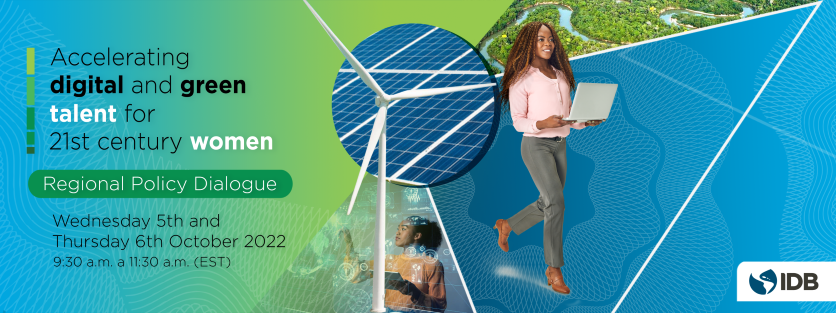The acceleration of technologies and climate change related challenges have significantly changed the way we live, and the labor market is not staying behind. How can we leverage on these changes to promote more and better work for women?
At the recent Regional Policy Dialogue “Accelerating digital and green talent for 21st century women” organized by the IDB, we sought to answer this question. We had the honor of receiving authorities from 23 countries in the region. These included more than 80 representatives from Ministries, Secretariats, Directorates in areas of gender, labor market and others related to the subject.

During the two-day event, we had the chance of talking to high-level panelists about digital and green talent. We analyzed how to integrate public policies that promote these trends, to enhance the participation and labor insertion of women in high-demand, quality jobs.
What did we learn?
The challenge of promoting women’s digital talent
One predominating subject on the first day of the dialogue was that women currently concentrate their human capital in fields with lower returns. This is due to multiple factors, such as the obstacles for a proper work-family dynamic, and the low vocational incentives to opt for education and training in digital subjects or careers.
Women study fewer STEM careers (Science, Technology, Engineering and Mathematics). According to studies carried out by the IDB in 2019, women represent less than 35% of graduates in these areas. Consequently, female participation in the technology sector -one of the most demanded and with the highest salary return- is particularly low. They constitute 42% of the people employed in the digital labor market.
Similarly, in the entrepreneurship sector, the trend of creating smaller sized companies with low technological integration prevails, which affects their performance. In addition, the rapid growth of process automation and artificial intelligence are not necessarily advancing in an inclusive manner.
Is it possible to overcome these barriers and boost women’s digital talent in a way that benefits them? The answer is yes – and some countries in our region are already doing so. In this video, you can see how Jamaica, Chile and Peru carry out initiatives that seek to break down these barriers. These cases were also presented as part of the Dialogue panels.
Green jobs: a window of opportunities for women in the region
The second topic that we delve into in the dialogue is how the green economy offers countries a world of possibilities. We are talking about a growing sector, that holds an enormous capacity to generate employment and socio-economic benefits.
A study conducted by the IDB and the International Labor Organization revealed that by 2030 up to 15 million jobs will be created in the transition to a sustainable economy. This means that, as in the digital economy, we can take advantage of the new demands of the labor market to promote the inclusion of women. We can create more and better jobs, contribute to the mitigation of climate change and, in addition, promote the closing of gender gaps.
However, for this to become a reality that allows a gender-equal and green economy, the region must first address certain structural challenges, for example, the problem of occupational segregation. The ILO estimates that, prior to the pandemic, women represented less than 25% of the workforce in the region within key sectors for the green transition, such as bioeconomy, energy, mining, tourism, construction, mobility and transport, waste, circular economy and manufacturing.
Along these same lines, it is estimated that more than 80% of the new jobs that will arise from different decarbonization programs will be in sectors that are currently men-dominated. If we want to get a more hopeful panorama, it is essential to promote the acquisition of new skills. The transition to a low-carbon economy is changing occupations, demanding new tasks and skills, and this change cannot – once again – leave women behind.
How to overcome this second challenge? We invite you to watch this video about the discussed examples of programs in Ecuador, Brazil and Colombia that are being carried out in the region to break down these barriers.
The future of work: a sea of opportunities for inclusion
It’s no secret that digital skills can make a big difference in people’s lives. Particularly for women in the region, they become key tools to develop professionally, achieve salary increases or break down barriers to financial inclusion by accessing loans and other benefits offered by banking institutions.
The green economy, on the other hand, has enormous potential to generate high quality jobs. A renewed focus on gender and climate change issues allows us to continue promoting sustainable and inclusive growth in the region. Together with expert voices, the Regional Policy Dialogue allowed us to highlight the urgency of rebuilding the productive and social fabric of our region, taking the transformations that employment drives into a door to care not only for the well-being of the current generation, but also the ones to come.
It is time to see the future of work and its demands, not only as a challenge, but as an opportunity to achieve the integration of women into the labor market with: formal, high-quality, sustainable and better paid employment. Dialogues like these are just a first step to make that scenario a reality.


Leave a Reply